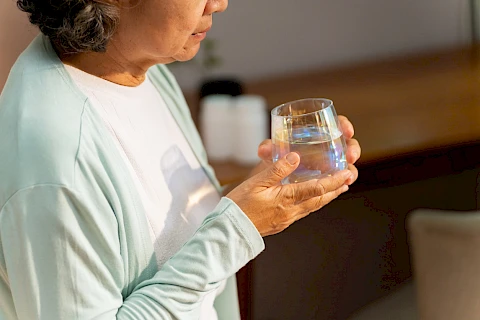
Water keeps our bodily functions running smoothly, impacting everything from energy levels to joint health. However, seniors managing incontinence might feel tempted to reduce their water intake, believing it will lessen those unpredictable urges. While this seems logical, it can cause more harm than good.
Senior Helpers will explore how hydration affects senior bladder health and share practical strategies to stay well-hydrated while managing incontinence.
The Role of Hydration in Bladder Health
Hydration is essential for keeping the bladder healthy. When seniors are properly hydrated, their bladders are flush with enough liquid, which helps rid their bodies of waste efficiently. This process also minimizes the risk of infections and irritations.
Dehydration poses serious risks like urinary tract infections and kidney issues. Hence, it's a common myth that drinking less water will ease senior incontinence. In reality, not drinking enough can irritate the bladder, potentially worsening seniors' symptoms.
Strategies for Staying Hydrated While Managing Senior Incontinence
Setting up a hydration routine is one of the best ways to ensure consistent water intake. Seniors should aim to drink small amounts of water every hour. This habit prevents dehydration and makes managing bladder control easier.
Choosing what seniors drink is as important as how much they drink. Water should be a primary beverage. It hydrates without any extra calories or caffeine which can lead to increased urination. However, seniors can also consider drinks like herbal teas or eat certain fruits and vegetables, like cucumbers and watermelon, which have high water content and can supplement their water intake.
To better manage senior incontinence, try adjusting the timing of their drink intake. Seniors can consume more fluids in the earlier parts of the day and gradually reduce as night approaches, which can help prevent night-time urgency. They can also keep a journal to track their fluid intake. Knowing how much they have consumed can help ensure they are getting just the right amount to stay hydrated without overdoing it.
Practical Tips for Caregivers
Encouragement is important if you're a caregiver helping a senior manage hydration and incontinence. Gently remind them to drink water regularly throughout the day and choose appropriate times for stronger beverages like coffee or tea.
Pay attention to signs of dehydration, which can include dry mouth, fatigue, and darker urine. Check in verbally with your senior loved one and ask them if they feel hydrated or if they require additional help. By staying vigilant, you can help maintain their health and comfort.
Contact Senior Helpers for Additional Assistance
Balancing the need to stay hydrated while managing incontinence can seem challenging, but it's an important aspect of maintaining overall health. With a thoughtful approach, seniors and their caregivers can ensure sufficient hydration while keeping incontinence in check. Health and well-being should always come first, and with these strategies, you or your loved one can enjoy that balance.
Remember, professional support is available. Click here to find a location near you for personalized senior care and support from Senior Helpers.

